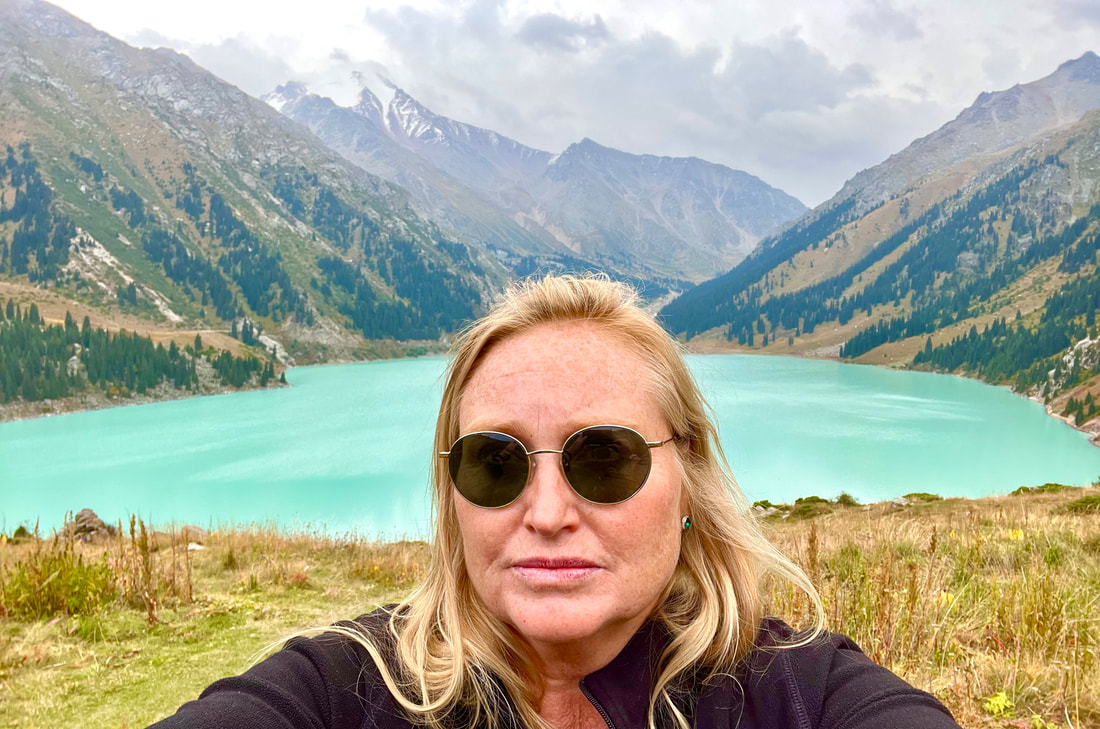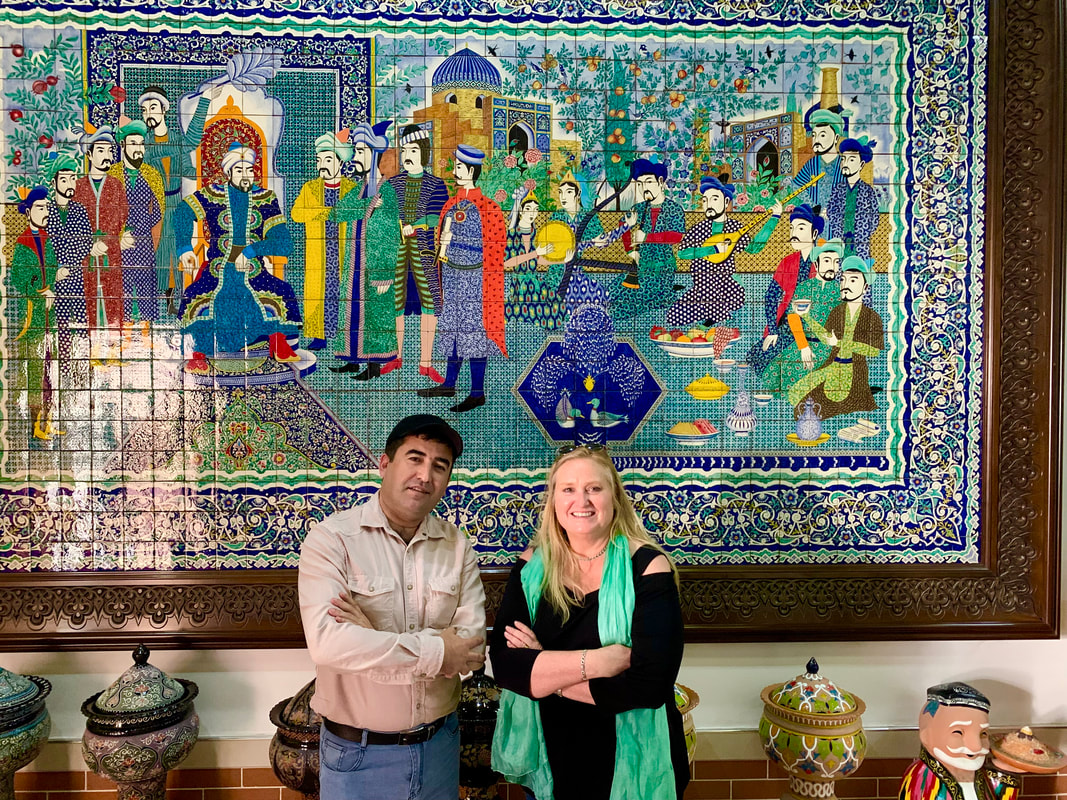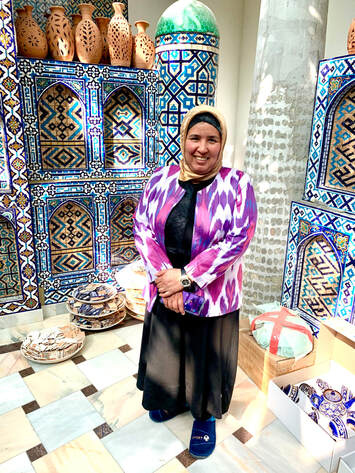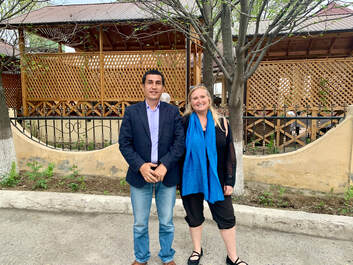|
Bahodirxon Eliboyev, a journalist-turn-blogger, and me in a ceramics factory in the Fergana Region of Uzbekistan. I am in Fergana, and I am being tracked. The State Security Services (SSS) contacts journalists after I have met with them. The SSS calls the hotel where I am staying several times a day and asks: Where has she gone? Who is she meeting with? What is the name of her translator? Other guests have even commented to me about these phone conversations. My interview subjects tell me they feel paranoid. Who informed on them? I tick through a small list of people who knew about my interviews. Who would inform on me? I sense a growing paranoia within me. It’s like I’m living in a Soviet time warp—or as one journalist told me—the Soviet Union 2.0. It’s not that I’m not used to such monitoring. Uzbekistan is the tenth post-Soviet country I’ve visited. But in places like Belarus, the KGB were more obvious. They sat across from me in restaurants, their tables spare and stared at me and whomever I was interviewing. Or they openly filmed me at public protests. I’m sure there’s a fat file in Minsk about me. Journalists in former Soviet states often know those who follow them. The security services there make it a point to be seen. Here the security forces’ secrecy feels much more menacing. “Pressure from the security services has only gotten worse over time,” explains Bahodirxon Eliboyev, a journalist turned blogger in Rishtan. Government spying and monitoring has had a chilling effect on both journalists and citizens, he said. His observations echo what journalists in Tashkent have told me. “Our journalism now is getting very dangerous,” Eliboyev said. “The security services can buy some journalists. If the authorities order, journalists write everything that officials want. That’s not journalism. That’s propaganda. Censorship is now in our minds and our hearts.” Unlike most journalists I’ve met in Uzbekistan, Eliboyev speaks openly about pressure journalists face. But he says normal citizens increasingly are afraid to speak out by name about wrongdoings they witness. “Citizens are afraid to talk to journalists because they can lose their jobs,” he said. “We have to teach them not to be afraid.’’ He says that filing stories with anonymous sources doesn’t carry the same authority as quoting people by name. “If I use anonymous names to protect them then it’s not developing journalism here. And I want to develop my country.” Eliboyev is controversial. He was fired from his first two jobs as a reporter after graduating with a journalism degree from Tashkent University. He then started two publications in Tashkent, but each time the prosecutor shut him down, he said. So he turned to human rights activism and blogging. On July 24, 2018, Eliboyev said he wrote a post on his blog wishing President Mirziyoyev a happy birthday and asking him not to forget the millions of Uzbek migrant workers who live in Russia and other countries because they can’t make a living in their home country. That afternoon four SSS officers pounded on the door of his garage apartment where he was napping. “When they saw I was living out of a garage, they asked; ‘Don’t you have a home?’ ” He said he told them: “I can’t work as a journalist. So where can I live? I can’t earn money at the one thing I’m good at.” They warned him he would go to jail if he kept writing about forbidden topics. He said he told them: “I can write whatever I want because your jail is like my garage. But your jail is more comfortable because I don’t need to find bread. You bring me bread. Your jail is for me freedom.” Eliboyev continues to blog about controversial topics. Just last week he says he was visited by the head of the terrorism police and told to delete a post or face a five-day detention and a 1.5 million sum fine. He deleted the post. Two hours after we met, Eliboyev sent me a text. He’d just gotten off the phone with the SSS. They wanted to know what he told me, he said.
“Censorship is inside of themselves,” he says. But self-censorship is real if a media outlet doesn’t want to lose licenses for crossing unknown red lines. At Ruxsor TV, near Fergana city, singer Nuriddin Asqarov says he pumped all his money into the television venture. I asked how the station had handled coverage of the Ukraine war. The general manager, Ibrohim Halimbekov, said the station is only licensed to produce 10 percent news. When I pressed further, I sensed employees in the room getting nervous. “We just cover life,” explained Halimbekov. “We do short reports on what is going on in the world. But we can’t go into detail. We are an entertainment station. We will lose our license.” Fear has forced some bloggers out of business. I met with former blogger Otabek Nuritdinov in his hometown Asaka in the Andijan region. In January 2020, Nuritdinov was detained for 15 days and fined over $1400 on charges of “slander, insult and disorderly conduct.” As Nuritdinov recounted these events, it was hard to imagine the soft-spoken man dressed in a blazer insulting anyone. After he was released, Nuritdinov faced more threats of arrest. In response, he refused to leave his house for six months. Shortly afterward he stopped blogging. At first Nuritdinov was hesitant to meet with me and to speak on the record. He doesn’t want any further problems with the government, he said. I went to Andijan and toured Nuritdinov’s tree nursery and, at his insistence, planted tree seedlings. After our three-hour interview, Nuritdinov agreed to let me use his name. But he asked me to be sure to mention his new venture of growing trees to produce clean air. Though he was still nervous when we parted, Nuritdinov posted pictures of us on his social media accounts. Everyone I met did this, even those who were nervous about being questioned by the SSS. I’m told that bloggers and journalists do this because there’s some cache in meeting with an American journalist. But I suspect there’s also an element of protection, that if they publicly acknowledge such interviews then they can’t be accused of meeting in secret.
She said she leads a clean life, doesn’t smoke or drink to eliminate any chance such vices can be used against her. Most importantly, she backs up her stories with documents, court papers and audio recordings. And she knows where the red lines are: she refrains from writing about the president or his family, religion, LGBT issues and private relationships between two people.
But even her precautions didn’t protect her from being questioned in 2016 by the SSS about why she was writing under pseudonyms in Ozodlik and the BBC. Then in 2020, Madrakhimov was shooting a video at a street market when a representative of the local governor grabbed her and took her to the police. She was detained for two hours while the police grilled her about why she was shooting the video. Finally, the governor called and told police that she was a journalist and to let her go. During last year’s presidential elections, she was asked not to report her observations until after the election, but she refused and posted stories anyway. After our interview, Madrakhimov texted me that the SSS had called her and asked what she was doing in Rishtan. She admitted she had met with me. (She also posted a picture of us on her Facebook account.) If they contact her again, she said, she will write about it in detail on Facebook. What troubles me about the SSS’s surveillance of me, is that my research of challenges faced by Uzbekistan journalists has been approved by the government. My official host is the Agency for Mass Media and Communication. So why did the security services in Fergana covertly track me? Whatever its goal, I doubt it was to make me feel what journalists and bloggers say they encounter every day—fear-induced self-censorship, suspicion of colleagues, and paranoia for their safety. Even I am not telling you everything. Comments are closed.
|
Fulbright in Central AsiaFrom March, 2022 to January of 2023, I was a Fulbright Scholar with the U.S. State Department in post-Soviet Central Asia. My previous Fulbright was in Ukraine. For the past six years, I have reported on journalists from post-Soviet countries who have experienced retaliation for reporting the truth. Archives
January 2023
|




 RSS Feed
RSS Feed
